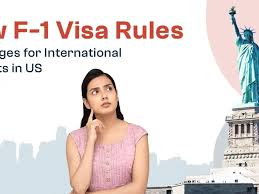New F-1 Visa Rules in 2025: Your Complete Guide
Introduction
In 2025, the U.S. government introduced a series of major proposed and implemented changes affecting F-1 student visas. These reforms impact visa duration, application procedures, social media screening, and more, marking a pivotal shift for international students eyeing U.S. education.
1. The end of the “Duration of Status” (D/S) and the fixed duration of the visa
What’s Changing?
For F-1, J-1, and I visas, the Department of Homeland Security (DHS) suggested substituting fixed stays that are in line with program schedules for the open-ended “Duration of Status” model, with a maximum of four years.
U.S. Department of Homeland Security RedBus2US, The Times of India Politic.
How It Operates:
The I-94 form will show the entry term.
Before their allotted time is out, visa holders must apply for Extensions of Stay (EOS) through USCIS, including biometrics and any necessary financial paperwork (RedBus2US).
The existing 60-day grace period is suggested to be shortened to 30 days
Why It Is Important
decreases overstays and increases oversight.
increases the demand on institutions and students to make precise timetable plans.
requires compliance with extension requirements and regular monitoring of visa status.
2. Limitations on Program Modifications and Course Transfers
Proposed Restrictions: Unless SEVP permissions are obtained, F-1 students would not be permitted to change their majors, transfer institutions, or change their educational levels during their first academic year (for example, because of institution closures or natural catastrophes).
The Financial Times
RedBus2US
India’s Times.
Impact at the Graduate Level: Graduate students might be subject to more stringent regulations, such as no program modifications for the duration of their studies.
3. Social Media Transparency & Enhanced Vetting
-
Mandatory Public Profiles:
As of June 18, 2025, all F, M, and J visa applicants must make their social media accounts public and submit handles used over the past five years. This applies to platforms like Facebook, X, Instagram, LinkedIn, TikTok, etc. The Washington PostVisafotoBusiness www.ndtv.com. -
Expanded Screening:
Consular officers now conduct rigorous online vetting as part of visa processing, including during returning student applications, often initiating administrative holds under 221(g) for deeper review. The Washington Post Office of Visa and Immigration Services.
4. New “Visa Integrity Fee” & Reduced Interview Waivers
-
New Fee:
Starting October 1, 2025, a $250 visa integrity fee (approx. ₹21,500) applies to most non-immigrant visa categories, including F-1 Business Todaywww.ndtv.comDay 1 CPTVisaVerge. The refund process is currently unclear. -
Interview Waiver Changes:
From September 2, 2025, most F-1 visa applicants—including renewals—must appear in person. Only narrow categories like diplomats are exempt. Business TodayOffice of Visa and Immigration ServicesVisaVerge.
5. Additional Measures & Country-Specific Restrictions
-
Travel Restrictions & Visa Validity Cuts:
Certain countries now face single-entry visas limited to 3 months, even while the program duration remains longer. This particularly affects students from select African nations (e.g., Nigeria, Ghana) on Day 1 CPT. -
Country-Based Bans:
Since June 2025, F-1 visas for nationals of 12 countries have been fully restricted, with additional partial restrictions on 7 more—though humanitarian waivers may apply Vi
Quick SEO-Optimized Summary Table
| Change | Details |
|---|---|
| Fixed Duration & EOS | End of D/S; max 4-year term; extension required via USCIS; 30-day grace period. |
| Academic Flexibility Limited | No transfers or major changes in first year; stricter rules for graduate students. |
| Social Media Vetting | Public profiles and 5-year handles required; deeper online background checks enforced. |
| Visa Integrity Fee | $250 fee starting Oct 1, 2025; refund unknown. |
| Interview Waiver Reduced | In-person interview required from Sep 2, 2025—waivers only for limited categories. |
| Entry Restrictions | Single-entry 3-month visa for some countries; bans for certain nationalities. |
Why Students & Institutions Need to Respond
Practical Planning:
Fixed visa term demands meticulous preparation around program length and next steps.
Financial Strategy:
Added fees and costs may strain budgets—students should plan early.
Document Readiness:
Strong documentation—academic, financial, and digital—is now more vital than ever.
Privacy & Vigilance:
Make social media profiles public well ahead of the application. Avoid content that may harm your case.
Policy Awareness:
These are proposed rules and may evolve. Stay in touch with DSOs, legal advisors, and official updates.
